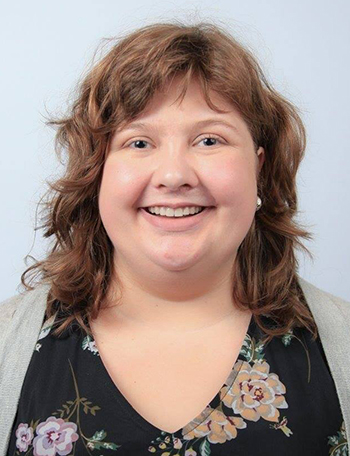Nicole, Computer Science

I love my work! I get to do really cool stuff and solve interesting problems, and I also feel like I get to do work that is aligned with my values. I want to make the world a better and more accessible place, and I feel really fortunate that I have a job where I get to do that. I'm a software engineer. I work on one of the accessibility teams for Microsoft Windows, coding different things to help increase accessibility in the Windows ecosystem.
I have dysgraphia, which is a learning disability that affects my ability to do handwriting and write in a legible, fast, nonpainful way. I also have challenges around spatial processing, but they're less diagnosable. One of the big things that helped me in school was getting extra time on tests, and I typed a lot of tests instead of having to hand-write.
I didn't get diagnosed with disabilities until I was around 17. There was a period of time when I was younger—I think probably early elementary school—where I really struggled in school, not because I wasn't capable, but because I didn't know how to take what the teacher was telling me and put it in my brain in a way that made sense.
I spent a decent amount of time when I first started getting accommodations thinking I was getting an unfair advantage. That's the narrative you're taught, when really, it doesn't make sense. Accommodations, all they're doing is saying, “We have this world that is not built to fit everyone—what can we do to make it a better fit for more people?”
When I started college, I wanted to study neuroscience—partially because of my own experience being a person with disabilities. I went through most of my college career learning about brains and being very happy. Then the summer before my senior year, I took a computer science (CS) class, thinking I was going to hate it. Within two weeks, I’d rearranged my entire fall schedule to take the next CS course in the series. I started exploring a lot more computer science and getting really excited about it. The more I was doing it, the more I was realizing how much accessible technology has helped me to be able to succeed in school. I was like, “What if I could start building things and making it possible for other people to have more access?”
“The way I think of neurodiversity is that your brain just doesn't work the exact same as the prescribed brain that we decide everyone must have because it's what our society is built around. You think about the world in a different way; you interact with the world in a different way; you see things differently. And sometimes because of that, it means that you can end up on a different page than people who are not neurodivergent. Their brain just works one way, and your brain does not.”
- Nicole
When I decided to shift what I was doing from neuroscience to computer science, it was a really scary thing. I feel really proud of myself that I spent the time to think about, analyze, evaluate, and make the best decision for me. Ultimately, I wanted to see how I could take CS knowledge and use it for good. I was fortunate enough to enter the CS program as a postbaccalaureate student. When I got the opportunity to take a fifth-year master's program, I added it on. I love teaching, and I know that at some point I might decide I want to teach full-time. If you have a master's degree in CS, you can teach at a decent number of colleges. My school had a really amazing opportunity for me to be able to do that—to teach and cover my grad-school tuition so I could actually afford it.
I think having learning disabilities and having school not be easy for me in the beginning meant that, when I was teaching, it was easier to say, “OK, I need to explain things in different ways.” And I think that also shows up in my job: When I'm working with people, I can say, “OK, let me change this explanation around.” I think my experience with being neurodivergent and having disabilities built a lot of empathy. What I would say to neurotypical people is just to have a lot of empathy and understanding that everyone's experience isn’t the same as yours.
I assumed I wouldn't get an accessibility job in tech until I had at least three to five years of experience. But I was fortunate enough to intern at Microsoft before graduating—and to get a return offer. They wanted to help me find somewhere I'd be happy, and they were willing to give me a spot on an accessibility team. After that, I worked on finishing up my degree and starting my job at Microsoft.
I want to keep making accessibility better for people, and beyond that I could maybe see myself doing some teaching and some things on the side. Right now I'm enjoying for the first time in my life not worrying too much about the plan. I love what I'm doing, and I'm going to keep doing it. If things change, I can reevaluate, but I’m in a position to do cool things that make a difference in the world, which is not an easy thing to find.